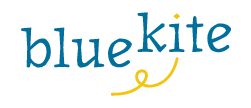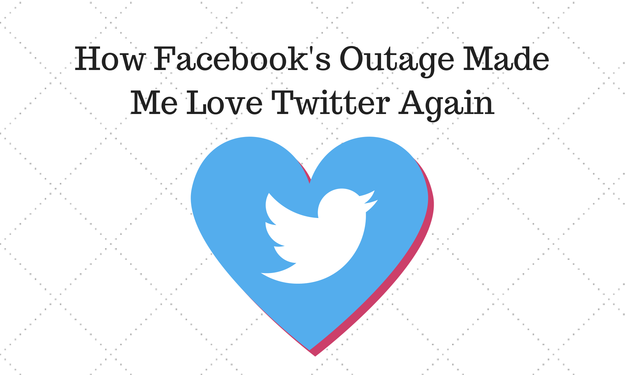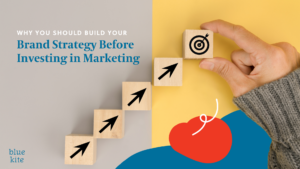As many of you may know, Facebook experienced a major outage on Friday. And, as people tend to do, we flocked to other social networks to talk about it.
In my case, I turned to Twitter to see what folks were saying.
And I have to tell you, Twitter was the most fun it has been in months.
People were hanging out, making jokes and actually having conversations on the platform. It felt like the early days of Twitter when people gathered on the platform to connect with others.
Let’s try not to panic while #Facebook is down. Should we gather up with flashlights & tell scary stories?
– Blue Kite Marketing (@flybluekite) August 1, 2014
Twitter used to be my favorite social network and I credit it with creating lasting friendships and some of my most important business connections.
But now, Twitter seems to be a shell of its former self.
We’re far more focused on building an audience instead of truly connecting with other people. And, as a result, people aren’t really present on Twitter anymore.
We schedule our messages, automate conversations and broadcast promotional content in hopes of getting noticed. And we only really talk when spoken to, like obedient children at the dinner table.
I’ve been feeling this way about Twitter for more than a year now. But, I’m certainly not alone.
A few months ago, The Atlantic stirred the pot with its controversial eulogy for Twitter, creating a debate about the future of the platform.
Although I don’t have a crystal ball about what the future of Twitter holds, I can say that the platform has definitely evolved from its early days.
Is it Twitter or is it us?
Despite the changes with Twitter itself, I can’t help but wonder — is it the platform or is it us that has truly changed?
As the world gets noisier, it gets harder to create real, meaningful connections. And, as our networks grow, it becomes more time consuming to have the same level of conversations we did when starting out in the social media space.
Not to mention, the social media space has become even more fragmented than it was a few years ago. Now, you don’t just have Facebook, Twitter and LinkedIn. You also have Pinterest, Instagram, Google Plus, Snapchat, Vine and more.
The competition for attention has become even greater. And, it means people have to make choices where to spend their time.
The harsh reality is that some networks will eventually fade away as a result. Or, at the very least, how people use the networks will evolve.
Should You Quit Twitter?
Does this mean you should abandon Twitter?
No.
I still think Twitter still holds tremendous value and I don’t think the network is going away any time soon.
However, if we want to create more meaningful conversations and connections on Twitter, we need to shift our focus and get back to some of the tenets that made the platform great in the first place.
How to Breathe the Life Back into Twitter
If you want to make Twitter more interesting and valuable for you, here are some things that have always worked for me. I’m going to focus on these in the coming weeks to help make Twitter more meaningful and fun.
- Strike up conversation. Don’t just wait for people to come to you. If you want more engagement with your audience, focus on answering other people’s questions first. That’s the best way to create conversations. Always has been. Always will be.
- Prune and refine connections. If you’ve been following everyone who follows you, it might be time to clean up your stream. You don’t have to unfollow everyone to do it. Create lists to help you connect with key people.
- Go outside your niche. Twitter can feel stale if you only follow like-minded people within your line of work. Connect with people outside of your industry or with those who have similar hobbies as you. That can help Twitter become more meaningful and fun.
- Join a Twitter chat. Twitter chats are great ways to join conversations and meet new people. Instead of jumping on the same old chats, find ones that you’ve never participated in and give it a try.
Here is a comprehensive list of Twitter chats.
- Go offline. If you want to get more out of your Twitter connections, take the conversation offline. In the early days of Twitter, I distinctly remember the day Ike Pigott picked up the phone and called me out of the blue. We were having a conversation on Twitter and the next thing I know we were talking on the phone. Although you might not be able to do this with everyone, identify key contacts that you want to get to know better. Start with email and grow the relationship from there.
- Get personal. If you truly want to get to know people on Twitter, it helps to start by sharing more about yourself. Ditch the non-stop stream of self-promotion and articles. Instead, talk about your hobbies or even what you had for lunch. Those are great ways for people to get to know a little more about you as a person.
I’m not giving up on Twitter. But, I know that I get out of it what I put into it. If I want to make the platform better, it starts with me.
What do you think – has Twitter lost its luster for you? Or, do you still find value there?
What tips would you add for breathing life back into Twitter?




14 replies on “How Facebook’s Outage Made Me Love Twitter Again”
Love this. ITA. I use lists and columns to filter, all this. Two things FWIW:
1) I learned FB was down.. on Twitter. Don’t know what it is about me, maybe I’m doing it wrong or am just overthinking it but I don’t get as much from FB. It’s fun, it’s nice but it’s not my go-to. Although there’s some professional crossover, it’s my personal space and I like it that way. But that also means as I juggle many different networks, it’s the first place I cut time b/c I’m focusing SoMe on growing my biz, my career.
2) One of my first posts on Twitter was ‘NOT tweeting about lunch’ – which I then later amended and revised a bit and now, gone the 180 (w/ a catch). It’s those moments as much as anything that connect us. It’s the conversations about nothing or the risks we take when we talk about sports or TV or anything non-business. Maybe someone is listening, maybe not; when taken as a whole, it gives a much better impression than just dumping content. Now the catch: lunch has to be really good. 😉 Which is just to say, keep it real but don’t over do it for the sake of ‘seeming’ real.
Thanks for weighing in, Davina!
I think I found out “officially” that Facebook was down while on Twitter. I just thought I was experiencing a glitch until I got over to Twitter to see it wasn’t just me.
Your point about Twitter being more fun is EXACTLY how I felt for a long time. Then, when I started to connect with more of my professional connections (most of which originated on Twitter) on Facebook, Facebook became way more fun for me. For me, Facebook has become the perfect balance of business and pleasure, where Twitter has become all business.
I think you’re right – we need to get back to share more of our personal selves on Twitter. Those truly are the things that we can build connections on.
Fantastic tips, Laura! For me, going outside of my niche is what gives Twitter new life for me. It’s always fun when I’m jumping into a new client because I get to mine a whole new community on Twitter related to their brand!
Also, I’d add “lighten up” to the last tip about getting personal. So many of us use Twitter “For Business.” I think we learned on Friday that all work & no play makes us all dull tweeps.
Danielle – I agree that diving into new client work makes Twitter more interesting. I think that’s one of the best parts of our jobs! 🙂
And your point about lightening up is spot on! The tweets from Friday prove that. This is a lesson I’ve really got to learn!!!
Twitter hasn’t lost its luster — It has remained true, while Facebook’s algorithm feeds us the crack that we’ve trained it to deliver. You hit it, though — the more you automate Twitter, the more robotic it will feel for you. Just don’t blame the network.
Hallelujah. We have come to learn, over time, that the odds of my post showing up in your FB newsfeed have dropped… and dropped…and dropped. There is now so much competition for space in your feed that organic content has just about disappeared, and the only content that reaches you is Paid/Sponsored content.
With Twitter, conversations and content can be easily managed with Lists. For what it’s worth, it matters not how many people follow you (it could be 1,000 or it could be 1M). What matters for quality dialog is how many people YOU follow.
I went to a high school of about 3,500 and I don’t know why but I seem to recall that that was a magic number– that’s about the number of faces & names you can remember. At any rate, it worked back then. So it seems to me (and I don’t have the proper citation to prove this) that if you follow a max of about 3,500 people on Twitter you could reasonably keep up.
I’m impressed you can keep up with 3500 people, Stephen! I think I read that number was much smaller – 400 maybe? Either way, you’re right – we have to determine how to best connect with that targeted group.
You know, it might even be 30 : )
In my case, I follow closer to 1,000 (but keep that upper number as a mental limit). I sometimes see people with 100,000 followers who likewise followback 100,000 people and I think to myself, “What kind of meaningful exchanges can you have from the middle of a football field calling out to the stands?”
But of course, the great unknown with Twitter is that no one knows about the Private Lists you maintain, which is where the real work is done… let’s call it Dark Twitter. It’s like Dark Matter, equally as big as the Universe, and exists right alongside it, but no one can see it or detect its presence (just like Direct Messaging).
Hi Laura,
In my comment below I “coined” a term called Dark Twitter… but apparently I’m about 2 years late to the party (ha! nothing new there) since today I just read that an entire conversation has been taking place around Dark Social.
Interesting stuff. Since you live & breathe in this market, I’m sure you’re well acquainted with it, but it might make a great column. Here’s the original piece I came across: http://www.mediapost.com/publications/article/231740/in-the-dark-about-social.html
And the Atlantic piece from 2012 it referenced: http://www.theatlantic.com/technology/archive/2012/10/dark-social-we-have-the-whole-history-of-the-web-wrong/263523/
Based upon how Dark Social is described (particularly in the Atlantic article), I would concur. Just today I shared links, photos and articles with friends and colleagues via IM, text and email. Not sure ANY of this would’ve been captured as as “social network” like Facebook or Twitter or been monetized.
Ike – Really love your perspective (and our great conversation today)! As our networks have grown, the ability to engage how we used to has become tougher. You’re right – Facebook automatically delivers what we think will be relevant. For Twitter, we have to do that work ourselves to weed through the firehose. It doesn’t make the network bad, it’s just different. We each have to learn how to best handle it.
“But now, Twitter seems to be a shell of its former self.”
I had a conversation over the weekend with some friends in which the subject of that very sentence was Facebook… and I know we’re hardly alone. Just goes to show it depends which circles you run in.
When the dust settles, Twitter will outlast Facebook: its utility is undeniable as a tool for communication, geopolitics, revolution and insurrection, search & rescue, earthquake prediction, mass sentiment and global pscyhcology. Too many hard and soft sciences, think tanks, regimes and political factions rely on it.
Facebook is damaged and scattered, and is showing signs of having “jumped the shark”. Will the last one out please turn off the lights?
Interesting take, Stephen. I don’t know that Facebook is doomed. I think it will take a lot for the big behemoth to fall. That said, I often wonder if it will become like AOL – too big for it’s own good.
But the one thing Facebook has learned to do well is monetize the platform. They’ve got incredible data at their fingertips and they’ve learned how to use it. I don’t think Twitter has that same advantage, even though the platform might be better in some regards.
The whole “making money” thing was an angle I conspicuously omitted from my shoot-from-the-hip analysis. (FWIW, after its 2nd Q earnings were released, Twitter found itself educating its investors how the service worked. Scary that analysts who indirectly move the price of the stock had to be educated that you don’t need to be “logged in” to view tweets.)
Just ran into this story today at random and wanted to share it as an example of the unceasing utility of Twitter:
“Computational Linguistics of Twitter Reveals the Existence of Global Superdialects” (MIT Researchers: The first study of dialects on Twitter reveals global patterns that have never been observed before)
http://www.technologyreview.com/view/529836/computational-linguistics-of-twitter-reveals-the-existence-of-global-superdialects/
I can think of no other platform which (as yet…as yet) can duplicate Twitter’s fundamental utility.